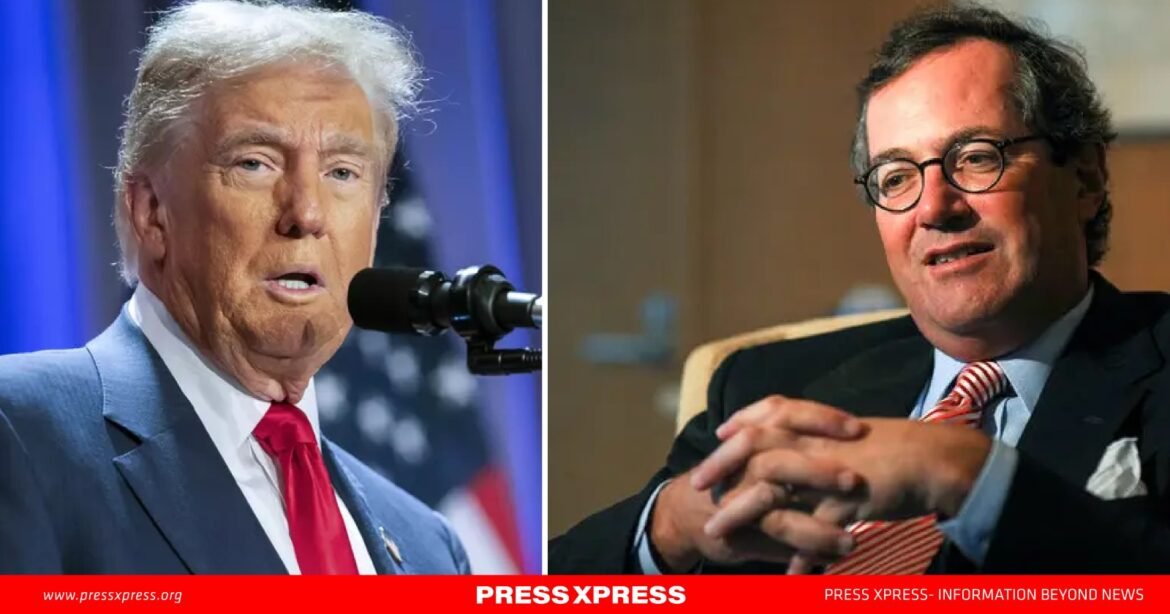Trump has nominated Warren Stephens as the new U.S. Ambassador to the United Kingdom, marking a shift in diplomatic strategy.
President-elect Donald Trump has selected Warren Stephens, the CEO of Stephens Inc., a prominent Arkansas-based investment bank, to serve as the next U.S. Ambassador to the United Kingdom. This nomination has attracted attention, not only because of Stephens’ prominence in the financial world but also due to his historical support for Trump’s political agenda. If confirmed, Stephens’ diplomatic efforts will be pivotal in shaping the relationship between the U.S. and the UK, a bond that has long been described as a “special relationship.”
Who is Warren Stephens?
Warren Stephens is a seasoned businessman with deep ties to both the financial sector and the world of philanthropy. As the head of Stephens Inc., he has steered the firm through decades of growth, overseeing substantial investments and financial services for clients ranging from private individuals to large corporations. Stephens has a reputation for maintaining a low profile, preferring to focus on the operations of his business. However, his recent political engagement has brought him to the public eye.
Born in Little Rock, Arkansas, Stephens has been a longstanding figure in the Arkansas business community. His company, Stephens Inc., founded by his father, is a staple in investment banking, focusing on a range of services from asset management to mergers and acquisitions. Despite his firm’s significant influence, Stephens has largely avoided public attention, until now. As an investment banker, his profile is both respected and controversial—especially due to his significant contributions to political campaigns.
Political Contributions and Support for Trump
Stephens’ political donations have garnered considerable attention over the years. In 2020, he was an active financial supporter of Trump’s re-election bid, donating millions to Republican causes and political action committees. However, his history with Trump is not without complexity. In the 2016 presidential race, Stephens donated approximately $4 million to political groups working to block Trump’s rise to power.
Yet, after Trump secured the Republican nomination and eventually the presidency, Stephens shifted his political allegiances, aligning himself with Trump’s vision for America. By the time the 2024 election rolled around, Stephens had contributed to both Trump’s campaign and other Republican candidates, signaling a full endorsement of the Trump administration.
In his statement following the nomination, Stephens expressed his pride in serving the United States. He acknowledged the critical nature of the U.S.-UK relationship, which has long been defined by military, cultural, and diplomatic ties. “I have expressed to President Trump that I would be extremely proud to serve our country and his administration,” Stephens remarked, underscoring his commitment to strengthening ties between the two countries.
The U.S.-UK Relationship and Stephens’ Diplomatic Role
The role of U.S. Ambassador to the UK is one of the most prestigious diplomatic positions, largely due to the historical and ongoing alliance between the two nations. The UK is one of the U.S.’s closest allies, with the countries sharing strong military cooperation, intelligence sharing, and a deep cultural bond. Under the Trump administration, the diplomatic direction has been guided by an “America-first” ethos, emphasizing bilateral relations and focusing on economic and defense interests.
Stephens’ nomination comes at a time of shifting global alliances, with the U.S. reevaluating its foreign policy priorities. Trump’s approach to foreign diplomacy has been marked by his focus on direct relationships with key allies rather than relying heavily on multilateral organizations. This preference aligns well with the U.S.-UK partnership, which has consistently been characterized by close personal ties between leaders, coupled with shared strategic interests.
If confirmed, Stephens will likely play a key role in advancing trade agreements, defense cooperation, and counterterrorism efforts between the two nations. The economic angle is especially important, given the U.S. and UK’s intertwined financial markets. As a top investment banker, Stephens will bring a wealth of expertise in financial matters, which will be crucial as the two nations navigate post-Brexit economic landscapes.
The Changing Landscape of U.S. Diplomacy
In the broader context of U.S. foreign diplomacy, Trump’s appointments of political allies to high-ranking ambassadorial positions reflect a continued trend of favoring loyalists to hold a better grip at the diplomatic arena. This is not the first time that a political donor has been tapped for a high-profile diplomatic post. Previous administrations, including Trump’s own, have chosen figures like Woody Johnson, the New York Jets owner, as ambassador to the UK, further cementing the link between political support and diplomatic selection.
While critics have often questioned the practice of appointing political donors to such influential posts, proponents argue that these individuals bring a unique blend of business acumen and personal investment in U.S. foreign policy objectives. In Stephens’ case, his financial expertise could be seen as an asset in strengthening the economic and trade relations between the U.S. and the UK, both of which have seen uncertainty in recent years due to Brexit.
What’s at Stake: The U.S.-UK Partnership?
The U.S.-UK relationship faces significant challenges in the coming years, not least due to global geopolitical tensions and the evolving post-Brexit environment. With Russia’s military escalation in Ukraine, the continued rise of China’s economic and military presence, and the shifting dynamics of international trade, Stephens’ role as ambassador will require not only diplomatic skill but also a nuanced understanding of global financial systems.
According to the Stockholm International Peace Research Institute (SIPRI), military spending continues to rise globally, with Russia increasing its defense budget by nearly $28 billion in 2024. In this environment, the U.S. and the UK will need to collaborate closely on defense and security, ensuring that their shared intelligence operations remain robust in the face of growing threats.
As the world grapples with mounting challenges, the “special relationship” between the U.S. and the UK remains a cornerstone of both nations’ global strategies. Stephens’ appointment comes at a critical moment for U.S. diplomacy, one in which his expertise in finance, coupled with his political ties, will be put to the test.


